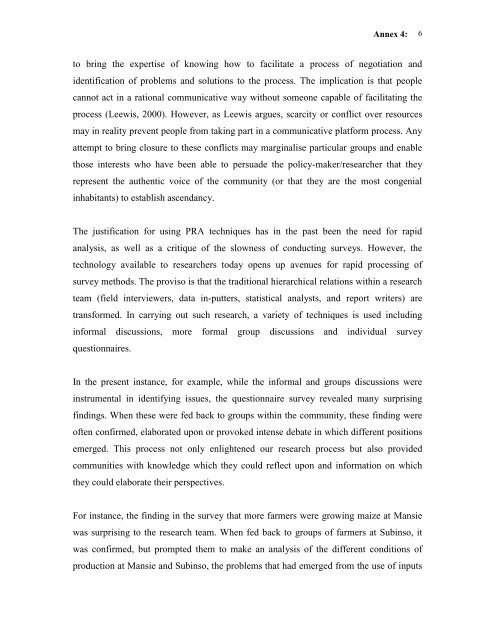Poverty Dimensions of Public Governance and Forest Management ...
Poverty Dimensions of Public Governance and Forest Management ...
Poverty Dimensions of Public Governance and Forest Management ...
You also want an ePaper? Increase the reach of your titles
YUMPU automatically turns print PDFs into web optimized ePapers that Google loves.
Annex 4: 6<br />
to bring the expertise <strong>of</strong> knowing how to facilitate a process <strong>of</strong> negotiation <strong>and</strong><br />
identification <strong>of</strong> problems <strong>and</strong> solutions to the process. The implication is that people<br />
cannot act in a rational communicative way without someone capable <strong>of</strong> facilitating the<br />
process (Leewis, 2000). However, as Leewis argues, scarcity or conflict over resources<br />
may in reality prevent people from taking part in a communicative platform process. Any<br />
attempt to bring closure to these conflicts may marginalise particular groups <strong>and</strong> enable<br />
those interests who have been able to persuade the policy-maker/researcher that they<br />
represent the authentic voice <strong>of</strong> the community (or that they are the most congenial<br />
inhabitants) to establish ascendancy.<br />
The justification for using PRA techniques has in the past been the need for rapid<br />
analysis, as well as a critique <strong>of</strong> the slowness <strong>of</strong> conducting surveys. However, the<br />
technology available to researchers today opens up avenues for rapid processing <strong>of</strong><br />
survey methods. The proviso is that the traditional hierarchical relations within a research<br />
team (field interviewers, data in-putters, statistical analysts, <strong>and</strong> report writers) are<br />
transformed. In carrying out such research, a variety <strong>of</strong> techniques is used including<br />
informal discussions, more formal group discussions <strong>and</strong> individual survey<br />
questionnaires.<br />
In the present instance, for example, while the informal <strong>and</strong> groups discussions were<br />
instrumental in identifying issues, the questionnaire survey revealed many surprising<br />
findings. When these were fed back to groups within the community, these finding were<br />
<strong>of</strong>ten confirmed, elaborated upon or provoked intense debate in which different positions<br />
emerged. This process not only enlightened our research process but also provided<br />
communities with knowledge which they could reflect upon <strong>and</strong> information on which<br />
they could elaborate their perspectives.<br />
For instance, the finding in the survey that more farmers were growing maize at Mansie<br />
was surprising to the research team. When fed back to groups <strong>of</strong> farmers at Subinso, it<br />
was confirmed, but prompted them to make an analysis <strong>of</strong> the different conditions <strong>of</strong><br />
production at Mansie <strong>and</strong> Subinso, the problems that had emerged from the use <strong>of</strong> inputs
















